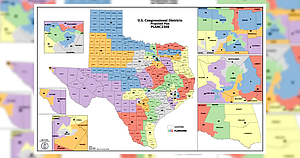8/1/2025

As we approach the 60th anniversary of the landmark Voting Rights Act of 1965—a cornerstone of American democracy birthed in struggle, sacrifice, and soulful resistance—we’re once again reminded that progress is a fight, not a finish line.
Signed into law by Texas native and U.S. President Lyndon B. Johnson on August 6, 1965, the Voting Rights Act (VRA) tore down the legal walls designed to block Black and Brown citizens from the ballot box. It was more than legislation—it was a lifeline for democracy in the Deep South and across the nation.
But here we are—one week away from that historic milestone—and Texas Republicans have chosen to stain this moment by dropping a redistricting map that reeks of racial bias and reeks louder than a political backroom deal gone sour.
"They’re Still Trying to Steal Our Voice"
Progress Texas Executive Director Kathleen Thompson didn’t mince words:
“60 years later, white guys are still calling each other to say how Brown and Black citizens can vote.”
And let’s be honest: She’s right. Instead of investing energy in urgent issues like flood mitigation, public health, or economic equity, GOP leaders are laser-focused on manipulating voting districts. The goal? Diluting the power of historically marginalized voters to maintain their own.
It's a throwback to Jim Crow dressed in a modern-day blazer. And it spits in the face of the giants who marched, bled, and died so we could cast a ballot without fear or failure.
What Did the VRA Do—and Why Should We Still Care?
The Voting Rights Act is one of the most transformative pieces of legislation in American history. Here's why:
It outlawed literacy tests and poll taxes used to silence Black and Brown voices.
It introduced federal oversight (the now-gutted “preclearance” system) in areas with histories of voter suppression.
It empowered bilingual and language-access voting, a nod to our nation’s growing diversity.
It stood as a legal shield against gerrymandering and voter dilution, especially under Section 2.
And yet, in 2013, the U.S. Supreme Court's Shelby County v. Holder decision cracked open the door for states like Texas to creep back into voter suppression mode—unchecked and unashamed.
A Modern-Day Quorum Break?
With the release of this discriminatory map, some Democrats are again floating the idea of a quorum break, echoing a legacy move from the Texas playbook of resistance. It’s not about obstruction—it’s about obligation. When the rules are rigged, walking out may be the only honest way to stand up.
“It’s time to lean on moral, legal, and even Biblical grounds,” Thompson said, “in line with a legacy of strong leaders who cemented the rights being threatened today.”
The Next Generation Must Know
As Texas children head back to school, what will they learn? That their vote matters—or that it’s constantly under siege?
Houston Style Magazine says this: Let’s teach them both—and then teach them how to fight back with ballots, voices, and civic fire.
Let’s support voting rights not just in memory of 1965, but in defense of 2025—and beyond.
